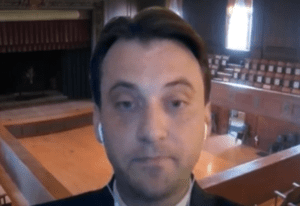Who is a member?
Our members are the local governments of Massachusetts and their elected and appointed leadership.

Arlington Town Counsel Doug Heim discussed open meeting law and other considerations for public meetings during the second webinar in the ATFC Annual Meeting series on Oct. 28.
The second webinar in the ATFC Annual Meeting series on Oct. 28 featured Arlington Town Counsel Doug Heim and Margaret Hurley, director of the attorney general’s Municipal Law Unit.
Hurley focused on areas where her office connects with finance committee members, including a new requirement that revolving fund bylaws must be approved by town meeting.
All town bylaws and charters must be reviewed by the Municipal Law Unit, whose decisions are available in an online, searchable database.
Hurley said finance committee members should look to their charters and bylaws to define the extent of their authority. If a member is looking to increase the authority of the committee, any citizen can make a petition for an amendment to town bylaws.
When finance committee members have legal questions that cannot be resolved by town counsel, Hurley suggested several outside sources, including the Municipal Law Unit, the Office of the Inspector General, and the Law Department at the Division of Local Services.
Heim focused on the open meeting law and other considerations for public meetings. His opening advice: If you’re trying to be clever with the open meeting law, you are likely in danger of violating it. He advised working through the finance committee’s chair or an executive secretary for all communications, and using an official town email address whenever possible.
When in doubt, he said, err on the side of posting documents, and always be mindful of the capacity in which you are speaking or acting. Also, be cautious when using Google Docs, which allow multiple people to post information, and the use of social media and serial communications.
Many communities are now conducting meetings in a hybrid manner. Heim recommends that all participants be viewing and hearing the same information and all votes be taken by roll call. At the start of each meeting, the chair must announce the name of the members participating remotely, which must be reflected in the meeting minutes. He said hybrid meetings often require some technical assistance.
The Finance Committee chair plays a key role in effective meeting management, he said. The chair manages public comment and input, and can limit how much time is allocated to this at meetings. If the committee has adopted a code of conduct, the chair should enforce it for all members. If the committee hasn’t adopted a code, the chair should propose doing so.
Heim noted that all communities should have an anti-fraud policy in place for all employees, including professional appointed staff as well as any volunteer or elected official in town. Everyone serving in a community has the responsibility and should have the opportunity to report fraud.